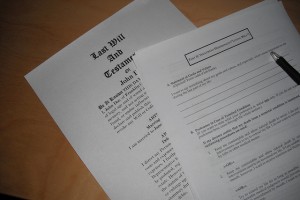 Families with disabled children face a host of obstacles in ensuring the long-term care of their loved one. There are tools and resources available to help facilitate that care for the future. One potential tool is known as an ABLE account. In 2014, Congress enacted a law allowing qualified individuals to establish ABLE (Achieving a Better Life Experience) Account. These accounts give favorable tax treatment to contributors and beneficiaries, alike. Families of children who suffered a disabling condition prior to the age of 26 should consider creating an ABLE account.
Families with disabled children face a host of obstacles in ensuring the long-term care of their loved one. There are tools and resources available to help facilitate that care for the future. One potential tool is known as an ABLE account. In 2014, Congress enacted a law allowing qualified individuals to establish ABLE (Achieving a Better Life Experience) Account. These accounts give favorable tax treatment to contributors and beneficiaries, alike. Families of children who suffered a disabling condition prior to the age of 26 should consider creating an ABLE account.
As of this post’s publication, Wisconsin does not have its own ABLE account program, but Wisconsin residents may establish an ABLE account through another state’s program. Minnesota launched its own ABLE program at the end of January 2017. Continue reading

 Wisconsin has become the 37th state to do away with the so-called “Deadman’s Statute” after a November ruling by the State Supreme Court repealed the 158-year-old law. The intent of the statute was to prevent “interested parties”—anyone with a stake in the outcome of estate litigation—from testifying about conversations they had with a deceased or incompetent person.
Wisconsin has become the 37th state to do away with the so-called “Deadman’s Statute” after a November ruling by the State Supreme Court repealed the 158-year-old law. The intent of the statute was to prevent “interested parties”—anyone with a stake in the outcome of estate litigation—from testifying about conversations they had with a deceased or incompetent person. It seems like challenges to
It seems like challenges to  Almost everyone has a substantial online presence today. This means that we will leave behind some type of Internet legacy as well. Whether you embrace social media sites and use them avidly or simply accept their usefulness, you should definitely consider addressing them in your estate planning documents. Continue reading to discover some of the many reasons why.
Almost everyone has a substantial online presence today. This means that we will leave behind some type of Internet legacy as well. Whether you embrace social media sites and use them avidly or simply accept their usefulness, you should definitely consider addressing them in your estate planning documents. Continue reading to discover some of the many reasons why. If you receive a phone call from someone claiming to be an IRS tax collector, you have a right to be suspicious. Since 2013, con artists have stolen tens of millions of dollars from innocent people by claiming to be collecting back taxes. The Treasury Inspector General for Tax Administration has received nearly 900,000 complaints regarding phone scams of this type.
If you receive a phone call from someone claiming to be an IRS tax collector, you have a right to be suspicious. Since 2013, con artists have stolen tens of millions of dollars from innocent people by claiming to be collecting back taxes. The Treasury Inspector General for Tax Administration has received nearly 900,000 complaints regarding phone scams of this type. Legacies for companion animals have made the news many times in recent years, from the $12 Million that hotel mogul Leona Helmsley tried to leave her Maltese terrier in 2007, to the full range of support that Joan Rivers left her four dogs. While it is not often that you can pull solid life lessons from the tabloids, these stories offer great advice and guidance. They show how common it is becoming for owners to plan for the care of their pets in their
Legacies for companion animals have made the news many times in recent years, from the $12 Million that hotel mogul Leona Helmsley tried to leave her Maltese terrier in 2007, to the full range of support that Joan Rivers left her four dogs. While it is not often that you can pull solid life lessons from the tabloids, these stories offer great advice and guidance. They show how common it is becoming for owners to plan for the care of their pets in their  There is no question about it; lawyers are not cheap. The concern over costs often drives individuals to try handling certain legal tasks on their own. This is especially true in the realm of
There is no question about it; lawyers are not cheap. The concern over costs often drives individuals to try handling certain legal tasks on their own. This is especially true in the realm of  As an
As an 
 Beneficiary Designations to Avoid Probate can be a Great
Beneficiary Designations to Avoid Probate can be a Great